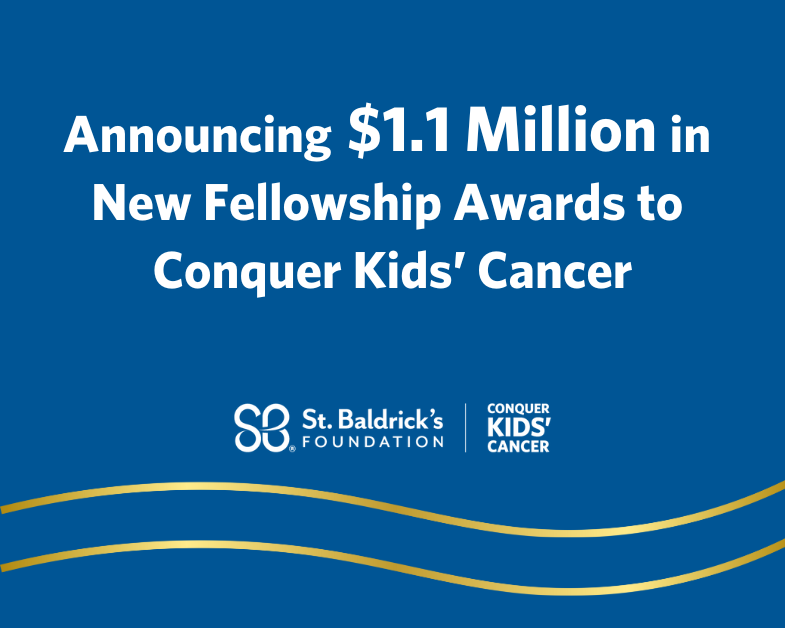The St. Baldrick’s Foundation Fellowship award is designed to support the brightest young investigators in the field. This investment of $1.1 million provides support for budding researchers to explore innovative ideas in pediatric cancer research.
Keep scrolling to see the amazing projects your contributions support.

The 2024 class includes five new Fellows:
Mohammad Abu Arja, M.D., at Baylor College of Medicine
Brain tumors are the most common solid tumors in children, and the leading cause of cancer-related death in children. CAR T-cells are engineered cells programmed to target cancer cells that have seen success in some leukemias. The application of CAR T-cells in pediatric brain tumors, however, is still limited.
One challenge is that CAR T-cells need multiple hits to kill brain tumor cells compared with leukemic cells, where a single hit is sufficient. Dr. Abu Arja and team discovered a subset of CAR T-cells that are more potent, making a second hit unnecessary. In this project, Dr. Abu Arja is studying this unique subset of potent killer CAR T-cells to better understand why they are superior killers.
Rahela Aziz-Bose, M.D., at Dana Farber Cancer Institute
Childhood cancer survivors face many challenges to living a healthy life—and one major challenge is heart disease. Heart health is closely linked to healthy eating, but some survivors cannot eat as healthily as they want because they don’t have access to, or can’t afford, healthy foods (a concept known as food insecurity).
Dr. Aziz-Bose will interview survivors to ask what they are eating, and to understand whether they experience food insecurity or other conditions that put heart health at risk. Using this information, Dr. Aziz-Bose will fine-tune a “food is medicine” intervention and test it on a larger scale to see its impact on food insecurity and heart health. The goal is to understand and tackle barriers to healthy eating so all survivors can have the best health possible.
Vanja Cabric, M.D., at Memorial Sloan Kettering Cancer Center
Immunotherapy is a type of cancer treatment that harnesses the body’s own immune system to target and attack cancer cells. While some immunotherapies have been very successful against certain tumor types in adult patients, they have been largely unsuccessful in treating pediatric solid tumors. This demonstrates how little we know about how the pediatric immune system responds to tumors.
Hepatoblastoma is the most common liver tumor diagnosed in early childhood, and new therapies are urgently needed to improve survival rates. Using samples and models of hepatoblastoma, Dr. Cabric’s research aims to identify the key immune cells involved in recognizing and responding to hepatoblastoma. Identifying the key immune cells involved in tumor immunity will allow researchers to find novel targets for future immunotherapies that work in children with hepatoblastoma.
Philip Pauerstein, M.D., Ph.D., at the University of California, San Francisco
Leukemia and lymphoma are blood cancers that are a major cause of death in children. Many of these cancers are curable with chemotherapy, but in some kids the cancer comes back and is harder to cure. Treatment with CAR T-cells is improving cure rates. However, this treatment still does not work well for about half the kids who get it.
Dr. Pauerstein is working to improve the sensitivity of CAR T-cells by using engineered cell adhesion molecules (the molecular glue between two cells). CAR T-cells do not attach to cancer cells as strongly as normal T cells do, and this limits their ability to find and kill cancer cells. Dr. Pauerstein is studying how changes in cell adhesion affect how CAR T-cells kill cancer.
Timothy Spear, M.D., Ph.D., at the Children’s Hospital of Philadelphia
Neuroblastoma is a devastating pediatric cancer, and those who survive are burdened with life-long side effects from chemotherapy and radiation. Newer therapies, such as cancer vaccines, provide an opportunity to mobilize a patient’s own immune system to find and destroy cancer cells. Identifying the unique genetic signature of an individual patient’s tumor allows scientists to create a personalized vaccine to stimulate the immune system to recognize tumor-specific mutations, called “neoantigens.” Dr. Spear has developed a new tool to identify these unique genetic signatures (neoantigens) and test the effectiveness of a vaccine in modes. These findings will hopefully lay the groundwork to develop a clinical trial using personalized vaccines for high-risk neuroblastoma and other pediatric cancers.
The following Fellows are receiving an additional year of funding, based on progress:
Ruyan Rahnama, M.D., at the University of California, San Francisco
Although advances have been made in treating acute myeloid leukemia (AML), many patients relapse and have poor outcomes. Dr. Ruyan Rahnama is studying immunotherapy to combat relapsed AML. The site where CAR-modified NK cells (engineered “natural killer” immune cells) and leukemia cells come together is known as the immunological synapse. This site plays a key role in activating the NK cell to make the immunotherapy work. Dr. Rahnama aims to better understand the biology of the immunological synapse to improve CAR-NK cell design for ultimate use as pediatric AML treatment.
Betsy Young, M.D., at the University of California, San Francisco
Currently, there is no specific treatment for osteosarcoma tumors that have spread throughout the body. Dr. Betsy Young will identify factors that control the spread of osteosarcoma, to develop new therapies. “I hope to identify a new medical treatment to unleash the immune system to attack osteosarcoma,” she says.
Thank you for your incredible support., The next set of grants will be announced in July, supported by donations made now. Visit the St. Baldrick’s Foundation grants page to learn more about all the research you’re making possible.
Donate now and help support research into better treatments for kids with cancer.
Read more on the St. Baldrick’s blog:

 SBF
Tweets »
SBF
Tweets »